Ockhams
Sampler
Extracts from the finalist books in the Jann Medlicott Acorn Prize for Fiction at the 2024 Ockham New Zealand Book Awards

Extracts from the finalist books in the Jann Medlicott Acorn Prize for Fiction at the 2024 Ockham New Zealand Book Awards
The Jann Medlicott Acorn Prize for Fiction at the Ockham New Zealand Book Awards is the country’s richest literary prize, with $65,000 going to the winner in 2024. It recognises both novels and short story collections by a single author.
This year’s fiction judging panel says there is much to celebrate amongst this year’s shortlisted novels, and readers will be rewarded by the richness contained within their pages. “These four singular and accomplished titles encompass pertinent themes of social justice, violence, activism, capitalism, war, identity, class, and more besides. Variously confronting, hilarious, philosophical, and heart-rending, these impressive works showcase Aotearoa storytellers at the top of their game.”
The 2024 fiction judges are reading advocate and former bookseller Juliet Blyth (convenor); writer, reviewer and literary festival curator Kiran Dass; and fiction writer Anthony Lapwood (Ngāti Ranginui, Ngāi Te Rangi, Ngāti Whakaue, Pākehā). They are joined in deciding the ultimate winner from their shortlist of four by best-selling British author, writer, broadcaster and former Booker Prize judge Natalie Haynes.
This Ockhams Sampler gives you a taste of the craft at play in each of this year’s shortlisted novels. You can read the judges’ comments about each finalist in mauve at the start of that title’s extract.
Look out for samplers of the finalists in the other three categories in the Ockham New Zealand Book Awards. As they are rolled out in the coming weeks, you will find them here:
www.issuu.com/nzbookawards
www.anzliterature.com
https://www.nzbookawards.nz/new-zealand-book-awards/resources/
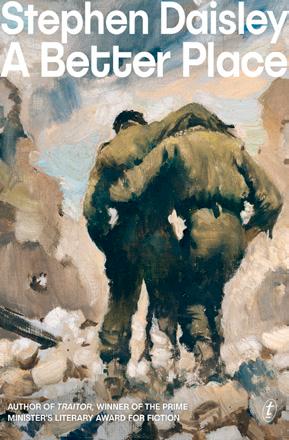
Stephen Daisley
Published by Text Publishing
12

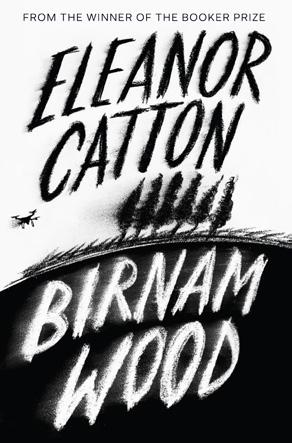

Pip Adam
Published by Te Herenga Waka University Press
Eleanor Catton
Published by Te Herenga Waka University Press
Emily Perkins
Published by Bloomsbury Publishing

The tragedies of war and prevailing social attitudes are viewed with an unflinching but contemporary eye as Stephen Daisley’s lean, agile prose depicts faceted perspectives on masculinity, fraternity, violence, art, nationhood and queer love in this story about twin brothers fighting in WW2. With its brisk and uncompromising accounts of military action, and deep sensitivity to the plights of its characters, A Better Place is by turns savage and tender, absurd and wry.
The last woman who saw him naked was in Northern Italy. Trieste. 1945. 86 Venezia Guilia on the Street of Whores.
‘Gesu,’ she whispered and made the sign of the cross. ‘Ma Donna mio.’
He continued to stare at her.
She nodded, held up four fingers. ‘Quattrocento lire.’
‘Four hundred?’
‘Si,’ she replied. ‘Four hundred. No cibo, mangiare. My children do not eat since two days.’ Her four fingers became two, and she took off her coat. Took off her dress.
‘I don’t want to know about your children,’ he said.
She bent forward and stepped out of her underwear. Her pubic hair was strong and black and her hipbones were pointed between the stretched skin of her pelvis. You could count her ribs. A pulse beating in her throat. ‘Tu parli Italiano?’
‘Some. I speak some.’ He was just twenty-five, a sergeant since El Alamein.
Reached out for her hand. There were red venetian blinds in the windows of her bedroom and a wooden crucifix on the wall above the bed.
She accepted his hand.
Told him to be quiet as he came.
The next morning, he left her all the money he had. The coins carefully stacked upon the notes on a table by the door.
A row of hooks on the wall. A raincoat hanging from one of the hooks. On the floor and against the wall, two pairs of children’s shoes on sheets of folded newspaper. Without food, they stop crying after two days. Talking, after five.
He closed the door behind him.
At the wharves off the Via Tedeschi, the military docks were surrounded by lines of waiting soldiers. He recognised a lot of them. Some would wink and turn their heads towards him as they greeted him. Nod, Roy. If they were not from there, they would often just say, Taranaki.
A chalkboard propped against a bollard: SP1/NZ, 18 Btn /22Btn/25 Btn/28Btn NZEF. HMS Dominion Monarch.
It was an ordinary thing for these young men to wait in lines. They were soldiers. They waited.
After about twenty minutes Roy was at the head of the line. He was beckoned forward by a young officer seated at a portable desk. Roy
stood to attention before him. Saluted. ‘Sir.’
‘Surname first please.’ The officer did not look up from the clipboard on the desk. ‘Christian next, or at least your initials.’ Holding his arms, looking down. Nodding as he spoke. ‘Rank and unit after that. Thank you.’
Roy did not know what to say to such petulance. Remained silent. ‘Well?’ the officer said.
‘Sorry sir. I’m not sure I know what you’re wanting here but my name is Sergeant Roy Mitchell. Taranaki. West Coast, Wellington. 22nd Battalion. 2nd NZEF.’
The lieutenant gripped his arms more tightly. A red and a blue pen before him; he aspired to the green ink of government one day. He could also smell him, this old soldier who did not answer properly. Absolutely stank of old sweat and alcohol. And a whore. Their dreadful perfume. The lieutenant flicked a page and continued to run his finger down the lists. Tapped the sheet and ticked the margin.
‘Let’s forget about that. There you are. Six years overseas?’
‘Sir.’
‘All theatres? Greece? Crete? Lost a brother at Maleme, I see. Twin brother?’
‘Sir.’
‘He is registered here as A. R. Mitchell. D. O. W. Is that right?’ The lieutenant paused, looked up at him.
‘Tony his name sir. Anthony on the regimental lists. A. R. Mitchell. Anthony Robert. Died of his wounds on Crete. That’s right sir.’
The lieutenant was frowning as he continued to read. ‘You were later posted to North Africa. Were at Tebaga Gap, Ruweisat Ridge, El Alamein, One and Two. Sicily. The Italian campaign. Wounded at Cassino I see. Later repatriated to Trieste where you rejoined your battalion in 1945. The 22nd. Is that right?’
‘Sir.’
‘Hold on,’ he said. ‘I have lost my place here.’ All impatience gone.
‘That’s all right, sir.’
The young lieutenant stared at him and nodded. He pretended to keep reading for a bit. He had not lost his place. ‘There we are. Safe trip home now, Sergeant Mitchell.’
Roy saluted and turned away.
It was indeed called Dominion Monarch, the troopship. The Yugoslav partisans in Trieste were pleased to see them go. They had gathered at the docks and stood in groups at the northern end of the wharf to bid them farewell. Some of them were passionate men and said goodbye to the New Zealanders by raising their clenched fists towards them, bent from the elbow and thrusting up and down. They were also yelling obscenities in Serbian and Croatian. Greek, Arabic. The insults were graphic, often involving their mothers and donkeys. Some were in Italian, the lingua franca of Trieste.
After a while one of the 22nd Battalion aboard the troopship yelled back. ‘Fuck your fucking dead.’ He was from Raetihi anyway.
Other Kiwis had begun showing their naked buttocks to the partisans on the docks. Probably Charlie Company boys. The Cowboys, they called themselves.
Two battalion officers came down from an upper deck and told the soldiers to stop what they were doing, and eventually they did.
The first of the six hundred and forty-two Junkers 52s had been flying above the Aegean Sea since before dawn. Short-arm crosses on their sides. Iron bodies. Corrugated wings. Three fine rotary motors. The black swastika on their tails.
The JU 52 transport plane was also known by many as Auntie Ju and beloved by the men of the leading assault company of the German Parachute Division, The Storm. Luftlande-Sturm-Regiment. Der Fallshirmjäger. Fine young men, and supremely confident. Most of them would be dead by the end of that first day.
Generaloberst Karl Student said it would break your heart if you let it. Instead, he ordered the massacre of the villagers at Kondomari. The destruction of Kandonos.
A ruthless man in revenge. He did not let the enormous number of the deaths of his young paratroopers break his heart. He let their deaths show that he was indeed a child of Frederick the Great. A true National Socialist.
The coastline of Crete appeared below them and the jumpmaster smiled, closed his eyes and made a fist. Raised three fingers. ‘Jungen.’
The young men looked back at him, their jumpmaster, as they shed height, levelling into the attack-run above the airfield.
Their platoon leader Zugführer Hauptmann Johann Von Schiller stood and took the spliced connection rope from his mouth. Hooked it onto the central overhead static line, his wrist action strong and certain.
One hundred fifty metres.
The other paratroopers raised up as he had, reminded themselves again of who they were. The first section, first platoon of the first company. AAMG Strike Battalion West. 11th Air Corps. Meindl
Group West. Der Adlerkrallesh. The Talons of the Eagle.
One hundred metres.
They all wore the buttoned Fallshirmjäger over-smocks. Knee pads and the distinctive shaped helmet; Reichsmarschall Hermann Goering’s division. The Luftwaffe eagle decal.
His expression had not changed, but it was Von Schiller’s intense honour to be the first to jump into combat for Operation Mercury. His pride somehow enhanced by the modesty of his movements.
Ninety metres.
Tuesday, 4th May 1941. Their immediate goal: Maleme airfield and the bridge across the Tavronitis River.
The weather conditions on Kreta were good. The jumpmaster had checked before take-off. Midday temperatures around twenty-two degrees Celsius. Now fourteen with a light southerly breeze. Dry. It would not rain again this summer.
Eighty-five metres.
The British colonial troops on the island were of little consequence. Many of them had shown themselves to be cowards in Greece, terrified of the Stuka. Running in circles at the screaming.
Seventy metres.
They would be swept aside as they had been before. It would take ten days to take the entire island and the airfield was essential. Maleme.
Sixty-five metres.
It was difficult to be heard in the noise and vibration of the JU52. They used hand signals for the most part. He turned, nodded and winked at the young Fallshirmjäger behind him.
All well trained. Prussian boys. Saxons too. They were given to this. Ropes, snatch lines in their mouths; hooking on, waiting for their turn.
Falling towards their combat height. Some laughing in their eagerness to jump. Others smiling as they dry-retched.
Sixty-three metres. Auntie Ju began singing to them. It was of the altitude; of their being there.
They were coming in from the east. Falling still. The rising sun behind them. Sixty-two metres. How much sooner? How much lower?
Hauptmann Von Schiller checked his watch. One minute before 8 a.m. Luftwaffe time: precise. The gliders would have gone in one minute earlier. The jumpmaster’s go button was still red; when it turned green, they would jump.
Sixty metres.
Height above ground confirmed. Sixty metres.
Green.
Go. Their lowest jumping height. Combat height. Von Schiller dived without thought. Arms outstretched out in the pose they all knew as the crucifix.
Sixty metres.
The chute snapped open and he looked to where, in about ten seconds, he would land. Put both feet together. Below him Maleme, the airfield. Victory certain. Falling. Three seconds before he landed. Two seconds. One two.
It was then the bullet hit him. An English round: copper-cased .303 lead ball, making contact with the crest of his hip and spinning him around.

Three giants hurtle through the cosmos in a spacecraft called Audition powered by the sound of their speech. If they are silent, their bodies continue to grow. Often confronting and claustrophobic, but always compelling, Audition asks what happens when systems of power decide someone takes up too much space and what role stories play in mediating truth. A mind-melting, brutalist novel, skillfully told in a collage of science fiction, social realism, and romantic comedy.
Extract from
‘on the edge of the gates of hell at the end of space and time’
‘Torren told us,’ Alba says, and the ship lurches hard and then shakes at itself. The strange new noise freed somehow and now louder and more confident. The new noise that is the old noise, the first noise, the one they brought from Earth, the one hidden to them because it would be better if they lived with it, but always there, grating, chewing at them. The noise that really keeps the ship going bare now. Out in the open, now they are questioning everything. Alba looks behind herself again. She can see their new destination. Bright in the dark. Orange.
‘It’s like a ring,’ she says. ‘A ring of orange.’
‘That sounds familiar,’ Stanley says.
Another lurch and then a drop and new noises. Screws loosening. Panels under stress.
‘It’s like hitting turbulence in a plane,’ Drew says. None of them had been in a plane. ‘Like the-air-hostesses-are-all-buckled-in level turbulence.’
It is that bad and then stops. Maybe there’s a gravitational pull that they’ve fallen into. Maybe not. Maybe they’ve crashed into something. It becomes very clear then, to all of them all at once. The past is confusing, none of them are sure of the past, but the present is here and falling in on them. There is no confusion in the present because death is sharpening their minds. Death sharpens everything acutely into the present moment and it feels like the truth. As if everything had been a lie before this one moment. They have been wrong about everything. And now, here they are.
Bang, the ship heaves again.
It is quite possible they will die not knowing. It’s completely possible they will die and have no idea how they got here and what came before they got to the classroom. And somewhere, light years from where they are, in a drawer perhaps there is a file and that drawer is in a filing cabinet and it tells the whole story. But they won’t know. It’s all confusing. Where they started and where the stories ended. But in the moment, as their heads smash this way and then that. That pain. That pain is truth. There is truth in pain. And then it’s gone. The initial hit, the pain dulls and rings or settles in, but the truth is gone.
‘Are we going to die?’ Stanley says. Always talking. Always talking. And then the sound comes worse than the physical pain, because it can soothe them or it can harm them and it harms them very hard and that is that. The sound which had been their fuel and their invisible friend turns on them in the ship. Even when they
all stopped talking it was there, but they hadn’t been able to hear it again until now. They’d heard it once on the ground and it had been the bed of the whole trip without them noticing because even at their loudest they were never enough. The hum that was magnified – the hum and the hiss of the station not quite on the station, of the vibrations of the microphone. That hum raises itself now and that is pain.
‘What about when we first took off?’ Stanley says. They had to shout at each other now, over the noise. The tone sets their teeth on fire if they hit certain places in their mouths, like if their teeth touch each other in the forming of an ‘s’ their whole face is set alight. But still they talk over each other. Shout, even though the shouting made the fire worse.
‘In the beginning.’ This is also a way that stories started.
‘But surely, we don’t want to go right back to the beginning?’
‘Where do you want to start from?’
‘I was just thinking – well, I think we’re all thinking it really –but I was thinking if we can go back to when it was working. Like properly, maybe we can backwards engineer it back into working again?’
It occurs to them now, suddenly and fully, what they’d done. That although they were useless, the sound was also useless without them – unable to deliver all the tones the ship needed. The power there had been in their silent rebellion. They had completely and permanently broken the ship and set themselves growing again. The growing, this growing was some kind of symptom of success rather than failure.
‘Maybe we were right to stop talking?’ Stanley says.
And they all think back and they see themselves, in the ship, creeping about – boots off. Silently nodding to each other. The silent conversation over breakfast, when they first noticed Shirley was growing. That was the first conversation in months. Coming out
of shock and fear. It broke the solidarity. And then they remember another conversation – from the planning of the silence.
‘We thought if we broke the ship, we’d remember,’ Drew says. ‘That we’d get it back. Ourselves before the classroom.’
The ship settles again, suddenly, and the sound levels out.
‘And we were wrong,’ Alba says.
‘And we were right,’ Drew says. ‘We remembered the white suit and Rufus and the Lotus and the Shop Around the Corner.’
‘Are we going to die?’ Alba says. She is sure she will lose her foot now. It has been scrunched at an odd angle for too long. To start off with she felt it go numb, then it pinned and needled but now, it just feels like it’s gone. Like it isn’t part of her anymore and maybe this is how it would be, little parts of her disassociating themselves with the whole of her. A foot and hand and then a forearm and a calf.
‘I’m so hungry,’ Stanley says.
‘I’d eat almost anything at this stage,’ Alba says.
‘Remember cheeseburgers,’ Drew says. And for a moment they are silent and think about cheeseburgers. They listen for them. Listen for them cooking and then for the noise they make as they’re being put together. And then they hear them in their mouths the private noise when they chew. It has been a long time since any of them have chewed but also maybe they had breakfast that morning maybe this is all fast and happening quickly and they really have nothing to complain about because really a bit of discomfort isn’t so much. Really. Like not so much.
‘French fries,’ Alba says. ‘French fries.’
‘How long does it take to starve to death?’ Stanley asks.
‘Days?’ Alba suggests. Her hand is pressed against her cheek in an uncomfortable way and she’s looking at it, wondering at its nutritional value. Now she thinks about it, now the conversation is live, it feels like there would be very little nutritional value in it, or in the act of eating something that was already ‘you’ but also, having to
support one less limb – surely there is some biological mathematics in that? Surely if it didn’t exist anymore and also you eat it surely there is some gain in that? Surely. Her hand is close to her face, she only has four fingers – her index finger on that hand has always been missing. Had always been missing since she got to the classroom. She lets her smallest finger slip into her mouth and rolls it around a bit. Her tongue seeks it out and plays with it and then she lets her finger play at her cheek and then she bites down hard on it. As hard as she can and it hurts and doesn’t yield. There is no breaking it into anything useful. She sighs. She will try again, later.

When Mira Bunting, the force behind guerilla gardening collective Birnam Wood, meets her match in American tech billionaire Robert Lemoine, the stage is set for a tightly plotted and richly imagined psychological thriller. Eleanor Catton’s page-turner gleams with intelligence, hitting the sweet spot between smart and accessible. And like an adrenalised blockbuster grafted on to Shakespearian rootstock, it accelerates towards an epic conclusion that leaves readers’ heads spinning.
It had taken Robert Lemoine barely twenty minutes to execute the man-in-the-middle attack. He had first sighted Mira when she turned off the highway on to the gravel access road and stashed her bike in the patch of scrub, and had gone at once to his controls; by the time she reached the second gate, he had forced a connection with her phone, accessed her identifying information, obtained her stored encryption key, simulated her over-the-air transmissions, established a connection with the local mast, and then authenticated himself so that from that point forward, he could appear to Mira’s
service provider as Mira’s phone, and to Mira’s phone as her service provider. Not only did he now have complete access to her data, both present and historic, he also had the power to intercept and change her messages in both directions; now, if he wanted, he could both alter what communications she received, and send messages –to anyone – as her. It was a flawless capture. Had she ventured a little further up the gravel road, she would have come upon the trailermounted mobile cell site, fitted with an IMSI-catcher device, that he had used to carry out the operation; had she taken her phone out of her pocket, she might have noticed that it was hotter than usual, and less responsive, and that the battery was draining fast; and had she looked directly overhead at any time while she was exploring the farm, she might have seen, high above her, the dark blur of a surveillance drone, hovering in place. Of course, she’d done none of these things – but that wasn’t surprising; no one ever did.
Lemoine adjusted his bearing. Beneath him, the glaciers and snowfields of the Korowai ranges were glowing peach and ochre in the late-afternoon light, the shadows mauve and violet, the seams and the crevasses midnight blue. He dipped his starboard wing to get a better look, passing over the high peak of Mount Korowai, with its distinctive triple step, like a serrated blade, and then straightened out and radioed for clearance to descend.
It wasn’t true what he had told her – that he was still learning how to fly. He’d logged over thirteen hundred flight hours in the past two years alone; the running joke at Autonomo, trotted out at every tedious toast and ribbon-cutting function he could remember, was that he didn’t trust his company’s own product, and that somehow, in all his years designing unmanned aerial systems, he had failed to grasp the meaning of ‘unmanned’. The jokes were tiresome, but he could admit the truth they gestured at. Lemoine loved nothing better than to fly. Nothing in the world compared to the liquid thrill of piloting a craft through three axes of movement, feeling the
vertical, the lateral, and the longitudinal as divergent possibilities curving away from him through air that was tactile and elastic and textured with a warp and woof. When in flight, he experienced a double realignment, a shrinking of the universe inside the cockpit that matched the dilation of the universe outside it, so that as the aircraft climbed and the air thinned and the ground fell away and seemed to flatten far beneath him, he began to hear his own breath through his headset, and to feel his heartbeat magnify inside his chest; he achieved, at altitude, a profound sense of his own proportion, of the sheer scale of everything he could be, everything he had been, everything he was – and in descent, as now, he always had a holy sense of having pilgrimaged, of returning having seen behind a veil. He was an excellent pilot, and although the airstrip on the Darvish farm did suffer from a crosswind, he’d never had any difficulty coming in to land.
Lemoine touched down at the airfield in Kingston and brought the aircraft to a graceful halt. His driver was already waiting, together with his security detail, to convey him back to his hotel, but after he had called in the landing and shut off the engine, he remained seated in the cockpit, smiling to himself, and tapping out a syncopated rhythm on his knee. It was seldom that he got the chance to interact with perfect strangers, and he had forgotten how arousing it could be to gauge his own effect on a genuine blank canvas, someone who had no idea what he was worth. Even more arousing was the fact that she had lied to him – and not in the squirmy, tiresomely self-exculpating way that he was used to whenever one of his factotums let him down, but flagrantly, defiantly, and with the kind of individual flourishes that bespoke a genuine enjoyment of the practice of deception. The camera was an especially nice touch. He might even have fallen for it if he hadn’t known already from her data that she was in the habit of assuming false identities. He smiled wider. Mira Bunting, he thought, tasting the syllables, you little criminal.
For Lemoine could recognise his own. He at least had not been trespassing – Jill and Owen Darvish had invited him to make full use of the place in their absence, to stay at the house if he wanted, to keep a car in their garage, to explore, to get a feel for the area, and by all means, please, to make himself at home – but like Mira, he was nursing ambitions for the Darvish farm that went far beyond the crime of trespass, and like Mira, he was highly practised in concealment; the Darvishes would have been very surprised to learn, for example, that in fact Lemoine had no need whatsoever to familiarise himself with Thorndike, since he had been conducting close surveillance of the region for the past seven years.
Not that they would ever find that out. As far as they knew – as far as they would ever know – Lemoine was just a billionaire looking for a bolthole, the kind of man who saw every crisis as an opportunity, and so had begun perusing real estate listings in Thorndike in the hours directly following the landslide on the pass. He was simply a far-sighted, short-selling, risk-embracing kleptocrat, an incarnation of unapologetic zero-sum self-interest, a radical misfit, a ‘builder’ in the Randian sense, a genius, a tyrant, an obsessive, a prophet, a status-symbol survivalist hedging his bets against any number of potential global catastrophes that he himself was doing absolutely nothing to prevent, and might even be taking active measures to encourage if there was a profit to be made, or an advantage to be gained, in the pursuit. This was the impression that Lemoine had taken pains to create, and it was in this guise that he had told the Darvishes that he was prepared to pay well above the asking price for their property, on the condition of absolute secrecy until the instant that the bunker – he watched their eyes widen – was safely in the ground.
He had already purchased a small fleet of diggers and earth movers to carry out the excavation, along with a few RVs and kitset mobile offices to accommodate the crew; these were waiting in a
warehouse at the Lytteltonport, along with the bunker itself, which had arrived disassembled, the component parts flat-packed into a dozen shipping containers that were ready to be loaded on to trucks and driven south. But the interment of the thing was only pretext. The real work would happen in the clean-up, after the bunker was interred. When all these vehicles left Thorndike, they would not be empty, or filled with slurry, or stacked with broken pallets or packaging or other waste. They would return to the port carrying a cargo worth not just billions, but trillions – a dollar value so enormous that Lemoine liked to put it in perspective by reminding himself, periodically, that one million days had not yet passed since the birth of Jesus Christ. If he pulled this off – and he had never failed in any of his ventures yet – he would become, by several orders of magnitude, the richest person who had ever lived.
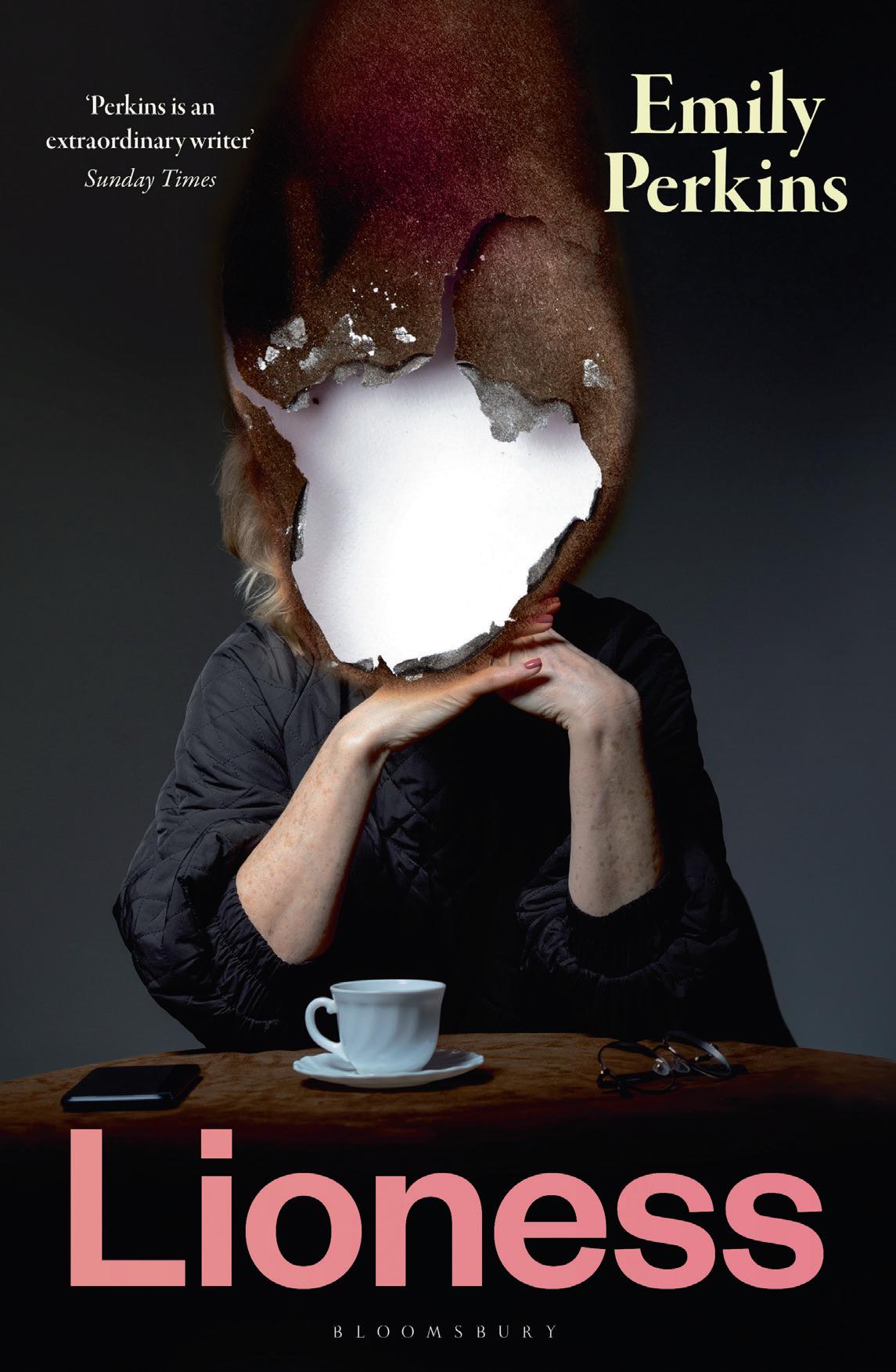
After marrying the older, wealthier Trevor, Teresa Holder has transformed herself into upper-class Therese Thorn, complete with her own homeware business. But when rumours of corruption gather around one of Trevor’s property developments, the fallout is swift, and Therese begins to reevaluate her privileged world. Emily Perkins weaves multiple plotlines and characters with impressive dexterity. Punchy, sophisticated and frequently funny, Lioness is an incisive exploration of wealth, power, class, female rage, and the search for authenticity.
Extract from Chapter 1
We had come to Sydney so Trevor could meet an investor face to face, and I could scout locations to open my first Therese Thorne store in Australia. It was early December, and the city had already attained a heat we wouldn’t feel back in Wellington even at the height of summer. The open-air malls were strung with Christmas lights, the sea burned in electric glimpses between buildings and trees, and that stink of flying foxes hovered in the Botanic Gardens – the sort of hot smell you can’t help sniffing for, like from a marker pen, or a pair of knickers kicked off onto the bedroom floor.
The Darling Point site was an empty retail space in a converted worker’s cottage fronted by frothing jacarandas. The small, lowslung building was the last of its kind on a side street, off a road lined by grand hedges which afforded occasional views of wedding cake villas and airy modern developments. The estate agent’s motorbike dominated the path that led to the front door, a sleek black insect that had waited outside all my viewings that week. I manoeuvred around it, sweating and nervous from the rush to get there, but inside, a respite from the heat, the space was quiet, and smelled cleanly of sawdust.
A wall had been knocked down to turn two small rooms – the front and back of the cottage – into one larger area. My sneakers squeaked on the floorboards as I circled the space envisaging my homewares here, textiles lining the exposed brick, ceramic treasures laid out on scrubbed wooden tables, ferns in macramé plant holders hanging from the ceiling. The window frames had been enlarged and paned with reinforced glass, and would be good for displays. A familiar pressure rose beneath my ribcage: I wanted it. I kept my expression neutral as I passed the estate agent. He pretended to be on the phone, but he was watching. I knew not to underestimate his baby-face, nor his compensating air of authority.
The back door led to a dark lean-to that must have been a kitchen, which I could use for storage. The windows looked out on a thin yard, an unappealing grey space that appeared wavy and distorted through the old glass. You couldn’t tell what was out there. I had a queasy feeling, as if this cottage were floating through time, and I was stuck inside with the realtor. I turned back to the interior, imagining a family of Victorian settlers crammed in: thick black clothes, crying kids. Foreign heat.
‘It’s gorgeous,’ I said. ‘But is there much foot traffic?’
‘It’s an exclusive area,’ the agent said.
‘If I started here,’ I said, ‘and word of mouth was good, it would
give a sort of cachet, right. Set me up to expand after a year or two. A department store tenancy, do you cover those?’
‘Maybe,’ he said. ‘If that’s the goal.’
It was. Therese Thorne Homewares had a flagship store in Wellington and boutiques in Auckland, Christchurch and Tauranga – the result of twenty-five years’ work. The next step was to set up here in Sydney, where I would fulfil my ambitions and Trevor would retire to sail and play golf in the sun. We weren’t quite ready yet – Trevor had to finish one final property development first, the big hotel project that was his last hurrah, and I needed to find investment to fund the move. If it weren’t for my sharing Trevor’s last name, the agent might have had me pegged as a tyre-kicker. But the real estate company had branches in New Zealand too, and they knew who Trevor was.
Trevor and I met in the 1990s, when I was not long out of university, having started in English Lit and ended up in Marketing. This was back when university was free. I was the first in my small family to go. At that time Trevor was a serial dater. He and Judith had been divorced a few years, after she had fallen in love with a friend, another mother from the tennis club. The other woman wouldn’t leave her marriage but things between Judith and Trevor were now, they agreed, over. They kept the details close, or as close as was possible in those scandal-loving circles. Judith asked Trevor not to tell the kids about her affair, and he didn’t, and he’d suffered for that when the children were young. Even now they were adults – my god, middle-aged – they still thought the divorce was his fault.
He had gone wild for a while after the marriage ended, leaving the four children – Annabel, Rob, Caroline and Heathcote – with their mother, while he travelled alone to Mexico, the Venice Biennale, sex parties in Berlin. When we were introduced in a café by a man I
was pitching an idea for a stationery business, Trevor had recently returned from racing motorbikes in the Angolan desert. I’d never met anyone like him in my life.
I make it sound like I knew what I was doing, ‘pitching’. In fact, I had met the other man, whose face I can recall vividly but not his name, at the hotel where I was a receptionist. I was twenty-two. Since graduating, my life had stalled. He was a regular business traveller and he kept asking me out for coffee till I said yes. ‘But not a datedate,’ I remember saying, and he laughed at me as if the idea itself was parochial. ‘Of course not.’ That was why I was trying to sell him on my idea. I didn’t want to lose control of the conversation.
Trevor, who knew this man from school, swung a chair over from another table and made me tell him why I believed nice stationery was important, and I spoke earnestly because I really did think people should have pretty things. I told him stuff I never meant to, about the girls in my class with their glitter pens and scented rubbers, the longing those pastel colours had instilled in me, the orderliness they suggested, houses that were clean and cheery, how could anyone with a pom-pom on the zip of their pencil case come from a home where people called one another a dumb bitch?
He listened, is what I mean. And the man, the business traveller, watched him watch me, and the next day when he was waiting for his taxi before flying back to Auckland, he told me he would put in $2,000 for a proof of concept.
‘By the way,’ he said. ‘You’re a pretty girl but you’d do better if you straightened up that eyetooth.’
Feeling brave and rich, I called the number Trevor had given me to tell him that news, and ask if maybe he would like to invest in the idea too.
‘I’m heading into a meeting, but I’ll call you back,’ he said. ‘I’ll be asking you out. You can decide whether business and pleasure mix. You can decide which is which, Teresa.’
I was still Teresa Holder, then.
I learned about his marriage on our first weekend away together, when we were recounting for each other, on that bed in his Martinborough house, our pasts. No – he told me his stories, but I didn’t reveal mine. My life seemed trivial next to his. He was more than two decades older than me. I played the blank slate, which no girl is.
Another thing I found out, but not till later, was he’d sent his old school friend $5,000, more than double his investment, to clear the field. At the time I thought that was romantic.
A year after we met, Therese Thorne sold its first line of stationery into shops. That was the start of it all.
‘What about Therese,’ he’d suggested when we were designing a label. ‘More aspirational than Teresa. And a last name is good too –creates a character the shoppers can identify with. But not Holder. How about mine?’
Soon after we launched, he suggested that I myself drop Teresa and adopt the name Therese. Therese was the homeware designer and bright businesswoman; Therese relaxed in white shorts at the beach; Therese got that wonky eyetooth straightened so that she could open her mouth when she smiled. Therese didn’t worry about what Teresa’s parents might have thought; they just needed to get the good seats at the wedding. First the brand had become Therese Thorne, then I did.
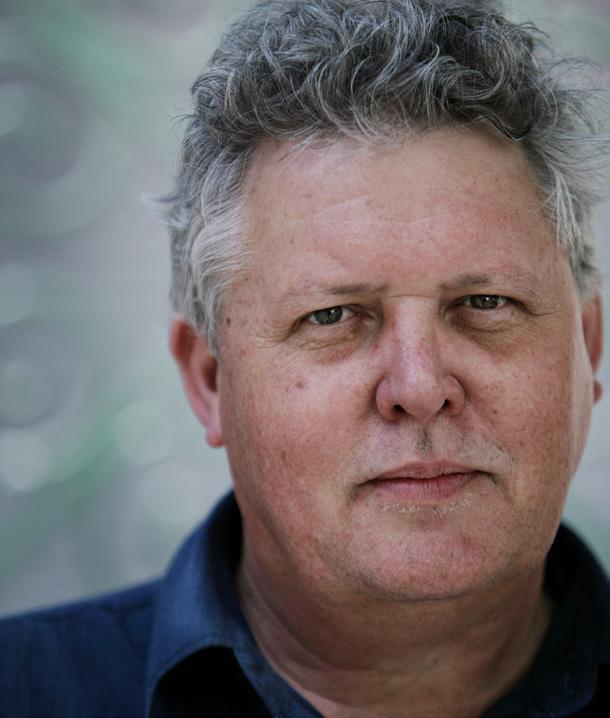
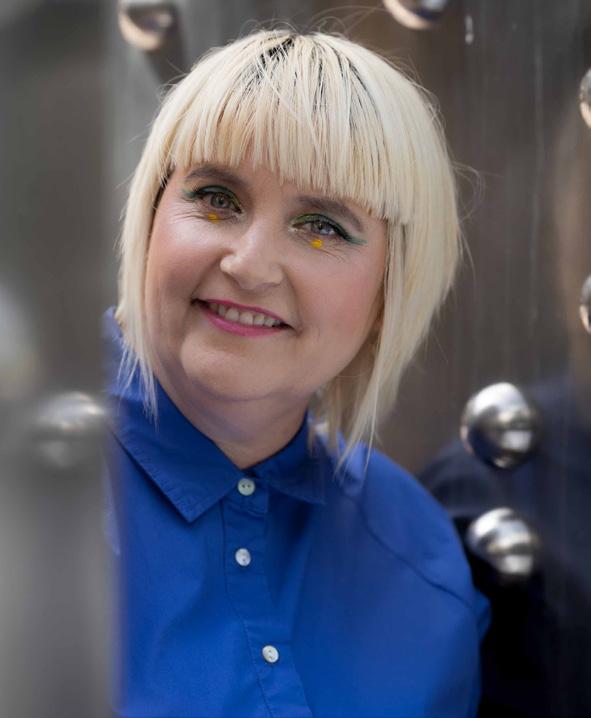
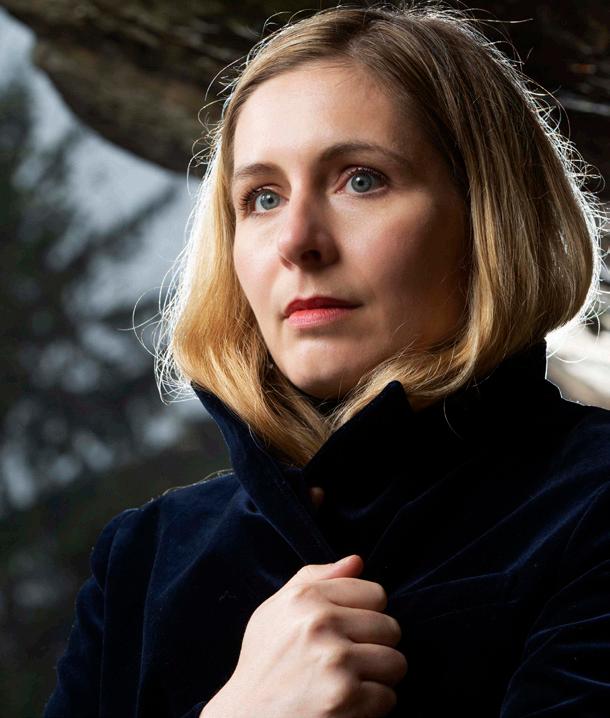

Whakamihi to all the authors whose work has been recognised and honoured in this this year’s Ockham New Zealand Book Awards. We encourage readers to seek their titles in bookstores and libraries around the motu. And we invite you to join us on Wednesday 15 May to hear the finalists reading from their books, and to celebrate the ultimate winners of the $125,000 prize pool at the awards ceremony, during the Auckland Writers Festival. To find out more follow NewZealandBookAwards or #theockhams on Facebook and Instagram.

The Ockhams Samplers were compiled with the assistance of the Academy of New Zealand Literature.
Look out for the other category samplers at:

